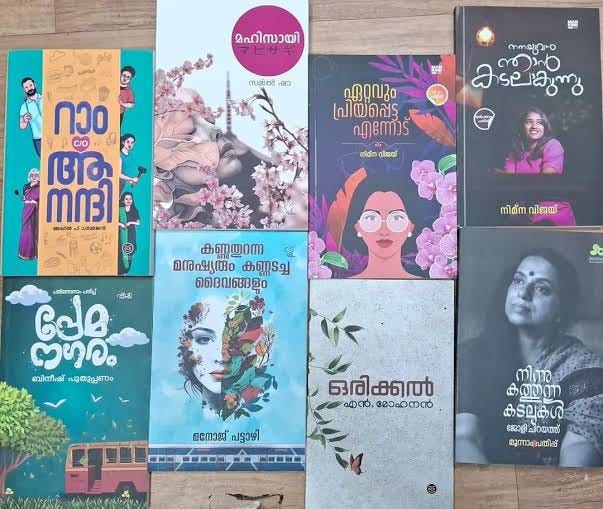Instead of listing out the best books I read like I did last year, I am planning to do a self-analysis of my reading, make some sweeping generalizations about the trends that I observed, and then some rants. As per Goodreads, I read 135 books in 2024. It's 5 more than 2023. But when I take stock of the quality of books that I read in 2024, I do find a severe lack in them. Unlike 2023, I haven't read many great books, the five-star ones. Most of my reads were of middling quality, but with some redeeming factors that made them worthwhile. It's only when I go through the list now that I feel like I could have done much better.
Many books that I read last year came from a book review site, which also offered a small compensation for my efforts. The books in their catalog are mostly self-published ones and rather amateurish. Though many books were interesting due to their radically different outlook and the clear deviations from the usual style of professional writers backed by profit-oriented publishers, the fact remains that they aren't actually well written.
One positive outcome of reading them was the tremendous improvement in my analytical skills of literature and reviewing capabilities. They made me more careful in reading, more equipped to go deeper to find hidden subtexts and to express them more properly, in a way that impresses the readers. I also became more critical in my outlook and found innovative ways to present them.
Now I am aware of the two types of positives and negatives in a book—subjective and objective. I form a subjective opinion when my own biases, likes, dislikes, and conditioning appear in it. Objective opinions are solely based on facts and evidence. Unlike the former kind, I can clearly justify them. I believe both kinds should be present in my analysis of the book, but the basis of a review has to be the objective opinions that I form about it. It's also important that a careful reader should be able to distinguish between both while reading it.
Apart from the amateurish books from the book review site, I tried a few more adventures that backfired. I always wanted to try the more recent books in Malayalam after finding that many readers on social media were showering them with praise. In 2024, I read many of them and found them unbearable in their language and content. Some twenty years back, in Malayalam literature, there were two streams of books. One was of the popular books that were serialized in several magazines. They lacked any literary quality but entertained the readers with melodrama, violence, or intrigue. The writers of these books like Joycee or Kottayam Pushpanath never claimed their works had any redeeming qualities other than providing raw entertainment for the public. The other stream was the more intellectual novels and stories that took the readers to a different level of understanding of the reality around them. These two remained distinct.
But today the writers write mostly the former kind of soppy books but aspire to market them as the higher stuff. For that, they take help from sycophants of social media who try to push them as great literature. When I read them, I didn't find any of these ascribed qualities in them. I find the duplicity nauseating and fear the new generation of Malayalam readers believing this is literature. I have already encountered a new reader who confessed to not have understood Basheer. I am planning to remove new Malayalam novels from my TBR, except some that I already possesses. Instead, I would read and re-read some of the better Malayalam books from the past.
I also tried reading some immensely popular authors who are hyped up by social media. My reviews of such books get good traction on Substack amd Instagram. I write about a great translation of an allegorical Syrian novel that brings to you a new awareness of war and the sufferings associated with it, and no one reads it. But I publish a post about Colleen Hoover's 'Layla,' and everyone jumps into it like crazy. I confess that just to get the high from having more readers and engagements, I wanted to read such books. But then I knew that the Syrian antiwar book gave me more insights on the world and emotional satisfaction than the supernatural romance, however celebrated the latter may be. I have decided that it is a waste of my time to read the over-hyped books, even if to criticise them. So next year be cautioned that I will be writing about more books that mostly no one reads.
Other than that, I will include more non-fiction in my TBR, especially technical books on some subjects that I love to go deeper into. For example, I am trying to read books on quality management. As a certified Green Belt in 6 Sigma and a Lean professional, though I don't have much use for them in my present profile, I believe we need more people interested in the subject to improve the general landscape of doing business. While pursuing the courses on these subjects, which focused on the practical application, I never had enough time or opportunity to read about the basic philosophy behind them. I believe reading books by stalwarts like Deming or Juran and trying to convey the messages to the public would be a worthy effort. Also, from the books that I already read, I have concluded that they contain proven insights to adapt to everyday life, far more than any self-help literature, most of which are mere subjective fantasies. I am planning to focus on such benefits of quality management books too in the next year.
So, I hope to have an exciting 2025, by reading some better books and writing my informed opinions about them along with engaging into some more creative efforts other than just book reviews.







That's quite interesting. How do you keep track of the pages?